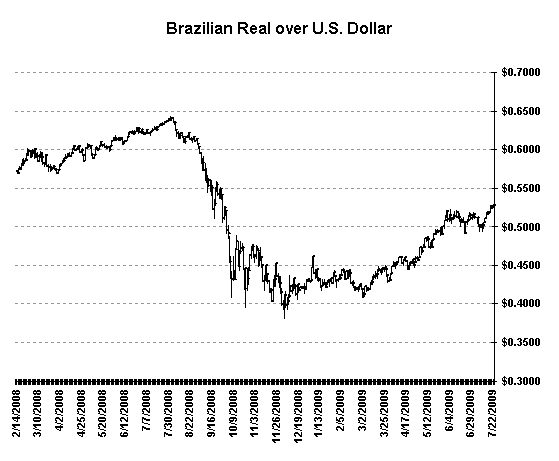Currency carry trading strategies have become more popular and easily available to private investors in recent years, and currency carry trades can be synthetically created using futures contracts. I think the Brazilian real provides a good vehicle for this strategy in the current economic environment.
If you aren’t familiar with the concept, currency carry strategies capture the interest rate differential between two currencies. In essence, it is like borrowing currency in a country where interest rates are low, converting it into a high yielding currency, and lending that new currency at the higher rate. The investor then collects the interest rate differential between the two currencies and absorbs the foreign exchange exposure.
One of the challenging aspects of a currency carry trade is that foreign exchange risk is also created. If the value of the higher-yielding currency declines relative to the lower-yielding currency, then a foreign exchange loss would result when the trade is unwound. Fortunately, this currency exposure can work in both directions. If the currency moves positively, it adds to the profitability of the trade. Ideally when establishing a carry trade, there should be both a positive interest rate differential and a strong argument for being long the currency with the higher interest rate. When both factors work together, carry trades can be very profitable.
Using currency futures contacts offers a simpler method of establishing currency carry exposure without the need of loans or investments in foreign Treasury bills. Currency futures contracts always incorporate interest rate differentials into their pricing. Therefore, individual traders can gain access to the implied interest rate differential more efficiently using futures contracts. Most individual traders execute carry trades synthetically using currency futures contracts.
Brazil’s Fundamentals
In recent years, there has been much talk of the carry trade between the Japanese yen and the U.S. dollar. This strategy is now much less popular as U.S. interest rates have fallen closer to Japanese rates, narrowing the differential and offering less incentive to absorb the currency risk. However, a potential carry trade exists whenever there is a wide interest rate differential between two currencies. This is the case between the Brazilian Real and the U.S. dollar. Central bank interest rates in Brazil are 8.75 percent, while the U.S. Federal Funds rate is only 0.25 percent. This 8.50 percent interest rate differential offers an excellent reward for traders who are willing to have exposure to the Brazilian currency.
There are also some very compelling arguments as to why the Brazilian currency should remain strong. Brazil is an emerging market that is transitioning into a developed economy, while it still has the competitive advantage of an inexpensive labor force. Brazil has a commodity-based economy. Its significant land mass contains vast resources in a variety of sectors such as agriculture, mining and forestry. Brazil is the global leader in the sugar-based ethanol industry, where exports will likely increase in upcoming years. Additionally, in the past year, the credit quality of Brazilian government debt has been increased to investment grade. All of these things create a solid argument predicting a bright future for Brazil and its currency.

During the most recent bull market in commodities the world saw just how dramatically commodity prices can move when the global economy is growing. During the next global growth phase commodities stand to make another tremendous move. Countries with vast natural resources will benefit from the rise of the developing world as a greater number of people compete to consume the available resources. Brazil clearly stands to be one of the long term benefactors of another commodity boom. At the same time, the high interest rates in Brazil create an extra bonus for traders who invest in its currency. If you would like more details on specific trading strategy, or have any other questions about the futures markets in general, please feel free to contact me.
Aaron Fennell is a Senior Market Strategist and Chartered Financial Analyst based in Toronto with Lind-Waldock , a division of MF Global Canada Co. He is accepting clients from Canada and can be reached at either 877-840-5333 or 416-369-7933, or via email at afennell@lind-waldock.com.
The data and comments provided above are for information purposes only and must not be construed as an indication or guarantee of any kind of what the future performance of the concerned markets will be. While the information in this publication cannot be guaranteed, it was obtained from sources believed to be reliable.Futures and Forex trading involves a substantial risk of loss and is not suitable for all investors.Past performance is not indicative of future results. Please carefully consider your financial condition prior to making any investments. Not to be construed as solicitation.
Lind-Waldock , a division of MF Global Canada Co. MF Global Canada Co. is a member of the Canadian Investor Protection Fund. 2009 MF Global Ltd.
Futures Brokers, Commodity Brokers and Online Futures Trading.
123 Front St. West, Suite 1601, Toronto, Ontario M5J 2M2



